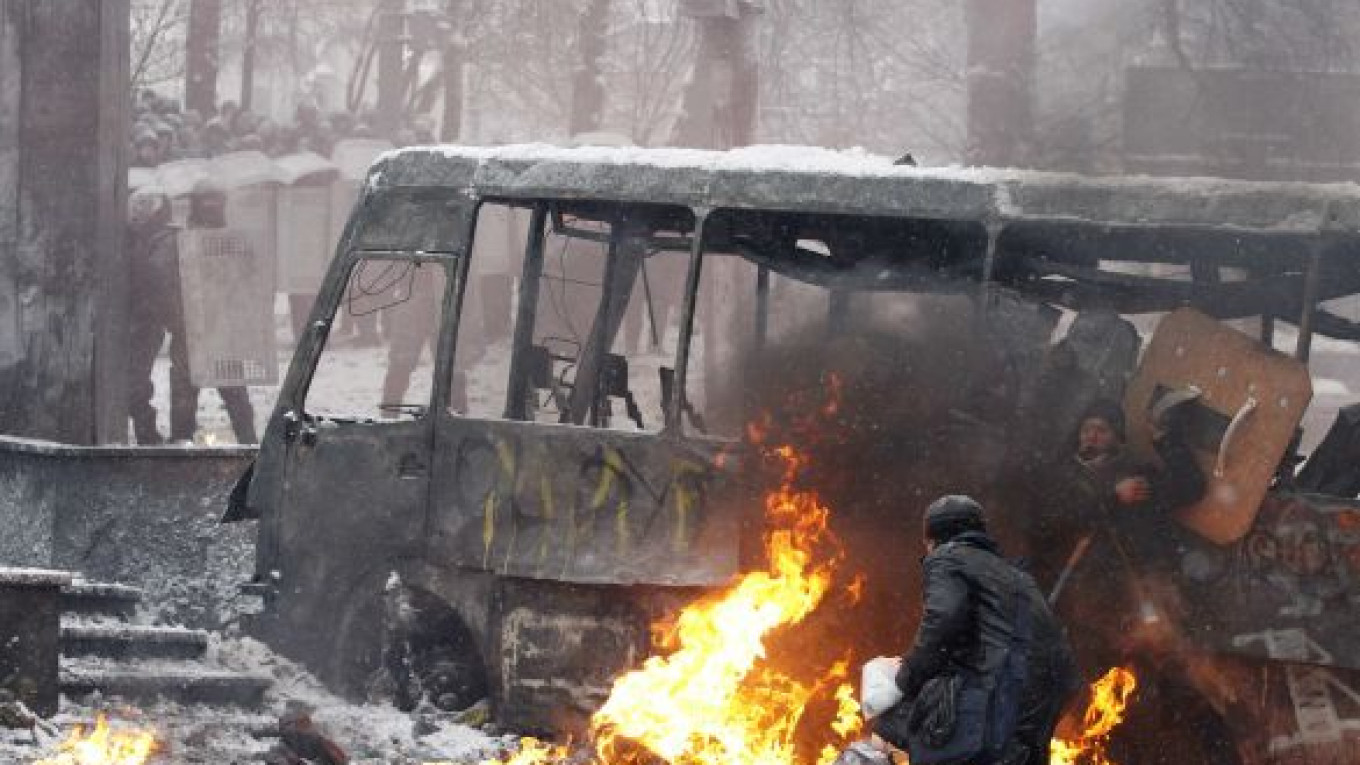Two people whose bodies were found Wednesday near the site of clashes with police were shot with live ammunition, prosecutors said Wednesday, raising fears that their deaths — the first after two months of largely peaceful protests — could further fuel violence on the streets of the Ukrainian capital.
Medics at the site said a third man died after he fell from a high point near a sports arena at the site of clashes, but Natalya Vishnevska, spokeswoman for the city health department, said that man survived the fall and was being treated in the hospital.
The protesters' deaths fueled fears that daily protests aimed at bringing down the government over its decision to shun the European Union for closer ties to Moscow and over human rights violations could turn even more violent.
Prosecutors said the two men were shot with live ammunition, and have opened a criminal investigation to determine who was responsible.
Prime Minister Mykola Azarov said the police did not have live ammunition and charged that opposition leaders should be held responsible for the deaths.
The three main opposition parties, meanwhile, issued a statement blaming President Viktor Yanukovych and his staunch ally Interior Minister Vitali Zakharchenko for the deaths.
The mass protests erupted after Yanukovych spurned a pact with the EU in favor of close ties with Russia, which offered him a $15 billion bailout. They swelled to hundreds of thousands after a small peaceful rally was violently broken up by police. Seeing the government ignore their demands and opposition leaders unable to present a coherent plan or even select a single leader, radical protesters have clashed with riot police in Kiev since Sunday.
The deaths came on the fourth day of violent street battles between protesters hurling fire bombs and stones and police firing back with tear gas, stun grenades and rubber bullets. The bodies were found before police moved to tear down protesters' barricades near official buildings in central Kiev and chased demonstrators away.
Helmeted riot police moved in on hundreds of protesters, dismantling the barricades, beating many with truncheons and firing shots at some. One man was attacked by more than a dozen policemen, was made to take off his winter jacket and dragged away, where he was beaten again. Dark smoke from burning tires billowed in the air and an armored vehicle was seen near police lines.
The police drove demonstrators down a hill toward the main protest site on Independence Square, where protesters have set up an extensive tent camp and rallied around the clock since November. There was no immediate police move on the main camp.
Oleksandr Turchynov, one of the opposition leaders, called on Ukrainians to rush to the center of Kiev to defend their country. "Ukraine will not be a dictatorship, it will be an independent, European country. Let us defend Ukraine!"
The U.S. Embassy said it was revoking the visas of some Ukrainian officials linked to the violence and was considering further action. The embassy would not name the officials, citing privacy laws. The EU condemned the violence and said it was also considering action against the Ukrainian government.
After several days of refusing face-to-face talks, Yanukovych met Wednesday with three main opposition leaders to negotiate a solution.
The protests were the biggest since the peaceful 2004 Orange Revolution, which annulled Yanukovych's fraud-tinged victory in a presidential vote and forced a new vote that brought his pro-Western rival to power. The current protests were also largely peaceful for nearly two months, but turned violent after Yanukovych, elected in 2010, pushed through sweeping anti-protest legislation and ignored all the protesters' demands. The deaths mark a turning point in the standoff that could lead to more violence.
"Look, the deaths and the injuries speak to the actions of those in power. They have crossed the line," said Andriy Kolosovich, 20, who was injured in the legs by a stun grenade and was being treated in a nearby medical unit set up by protesters.
The police move on the barricades came on the same day when much of international attention was focused in Switzerland, where peace talks aimed at ending Syria's war began Wednesday.
A Message from The Moscow Times:
Dear readers,
We are facing unprecedented challenges. Russia's Prosecutor General's Office has designated The Moscow Times as an "undesirable" organization, criminalizing our work and putting our staff at risk of prosecution. This follows our earlier unjust labeling as a "foreign agent."
These actions are direct attempts to silence independent journalism in Russia. The authorities claim our work "discredits the decisions of the Russian leadership." We see things differently: we strive to provide accurate, unbiased reporting on Russia.
We, the journalists of The Moscow Times, refuse to be silenced. But to continue our work, we need your help.
Your support, no matter how small, makes a world of difference. If you can, please support us monthly starting from just $2. It's quick to set up, and every contribution makes a significant impact.
By supporting The Moscow Times, you're defending open, independent journalism in the face of repression. Thank you for standing with us.
Remind me later.


